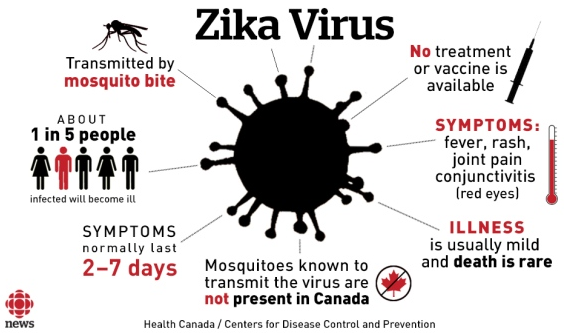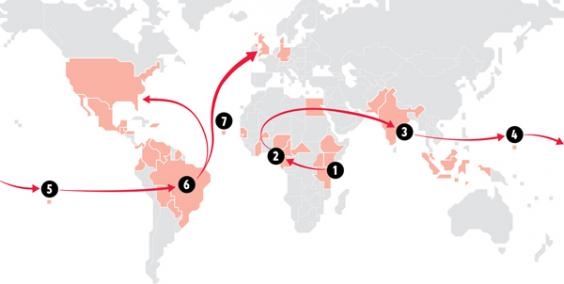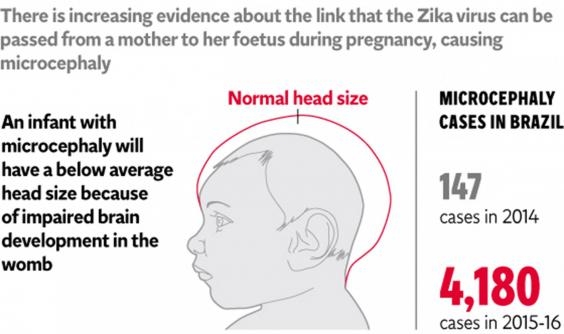Zika Virus, a mosquito borne disease has attained global pandemic status and continues to make headlines everywhere. Since May 2015, there has been a flare-up of Zika related infections in South America especially Brazil, Central America, parts of the Caribbean Islands and Mexico in North America. Aedes mosquitoes are the main carriers of this virus which enters our blood stream from a
mosquito bite and can spread from mother to new born, or through sexual contact and blood transfusion.
People infected usually do not have any symptoms, but some are known to develop fever, pain in the joints, rashes, headache and red eyes. It can be difficult to diagnose Zika as the signs and manifestation are related to other mosquito borne diseases like dengue or malaria. The illness caused by Zika is
quite mild but it can spread rapidly and the fact that health care professionals and researchers are still not sure about the effects and extent of damage caused by the virus and its mode of transmission is creating more uncertainty and anxiety about Zika.

Is Zika a potential threat for Ontarians?
The Ontario Public Health Agency has stated that the chances of the
virus spreading in Ontario are very low as the mosquitoes spreading the virus have not been reported in Ontario or any other province. Ontario reported its first positive case of Zika virus in a person who returned from Colombia in early February. Public Health Ontario has not divulged any other details about the person except to
rule out pregnancy. So far, The Public Health Agency of Canada has reported 14 confirmed cases of Zika in Canada, with the latest one from Saskatchewan and others in the provinces of Ontario, Alberta, British Columbia, and Quebec. In a recent development, which could also be the first sexual transmission case in Canada, a person from Saskatchewan has tested positive for Zika.
According to
Public Health Agency Canada:
- All the 14 cases in Canada who tested positive were either travelling to or returning from countries affected by the virus.
- None of the confirmed cases have acquired the infection locally.
- The numbers will increase in 2016 as roughly three million Canadians are expected to travel to countries where there is active transmission of Zika.
Canada is not part of the list released by The World Health Organization for countries that face potential danger from Zika virus as the Aedes mosquito is not endemic to Canada and the
weather conditions are not conducive for these mosquitoes to breed, a fact reaffirmed by Public Health Canada. Researchers at The St. Catharines University in Ontario, are checking if there is a likelihood of Aedes mosquitoes infecting the local ones and if so how it can be avoided.

Who is at risk?
Zika poses a huge threat for pregnant women as the virus causes microcephaly, a congenital defect resulting in incomplete brain development in new born children. In rare cases people infected with Zika may develop Guillain-Barré syndrome, an autoimmune condition leading to muscle weakness and paralysis.
Zika virus can survive for
2-3 weeks in our blood stream but strains of the virus can remain in the semen for up to 2 months after infection and has been known to cause sexual transmission of the virus.
The Zika outbreak has its epicentre in Brazil, which is gearing up to host the Summer Olympics later this year. It could prove to be a serious hazard to people and athletes visiting the country.

Preventive Initiatives
Public Health Ontario is taking measures to make sure provincial healthcare professionals are equipped to screen travellers coming to Ontario from affected countries and individuals showing indications of infection are being tested and treated quickly.
Travel advisories are being issued to Ontarians who are travelling outside of Canada. It is also collaborating with Physicians, Specialists and
research laboratories in Ontario to monitor and check the distribution of the virus.
Starting February 5th 2016, Canada Blood Services has enforced a 3 week waiting period for donors who have travelled outside of Canada, US and Europe to donate blood, stem cells or cord blood. This is a preventive measure to reduce the risk of contamination and eliminate any infection carriers from the
blood stream.
If you are pregnant or are considering pregnancy avoid travelling especially to the high risk areas. Check with your Physician, assess the risks and weigh your options if you cannot avoid travel. A waiting period of 3-6 months is suggested for women returning from affected areas
before conception.
There is no known or prescribed cure to treat Zika, but rest, keeping your body hydrated by drinking plenty of fluids and medication for relief from fever and pain is advised.
You can learn more about Zika virus and the measures adopted by the government by visiting
Public Health Ontario.



